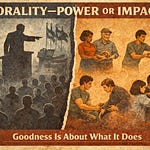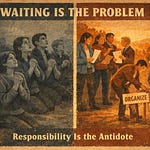Stories are powerful. They shape cultures, drive movements, and define how we understand the world around us. But what happens when those stories are used not just to inspire, but to manipulate? What happens when the vision we’re given for the future is less about inclusion and progress and more about control?
Welcome to ‘Mythologizing the Bible’—where we’ll be taking a look at three readings from the Christian Bible through the lens of “sacred myth.”
As we reflect on the readings for the 2nd Sunday in Lent, we’re going to look beyond the traditional Christian narrative to uncover a few lessons that should resonate with all of us, regardless of our religious background… or lack thereof.
In this episode, we’re diving into the ways religious stories have been used—sometimes for good, but many times for harm—and how understanding their power can help us think more critically about leadership, influence, and the messages we accept. We’ll talk about the role of storytelling in shaping authority, the importance of having a clear and ethical vision for the future, and why effective leadership requires understanding an audience, not just preaching to them.
Because here’s the thing: the people who tell the stories set the course for what’s to come. So, the question we’re asking tonight isn’t just what do these ancient stories mean?—it’s who is shaping the stories we believe now? And more importantly, how do we make sure we’re following the right ones?











